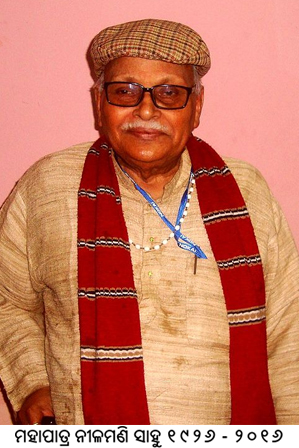Born :- 22-Dec-1926
Died :- 25-Jun-2016
Place of Birth :- The rural town of Niali, Cuttack

Prolific writer, reputed storyteller, translator and famous for his storytelling style with comic elements, Mohapatra Nilamani Sahu was born in a wealthy zamindar family on 22 December, 1926 in the rural town of Niali in Cuttack district. He studied and completed matriculation at the Binjharpur High School and later went on to finish his graduation and post-graduation in Odia at the Ravenshaw College, Cuttack. After post-graduation, Mohapatra Nilamani Sahu took up the job of a librarian at the Sambalpur University where he continued for two years. Later he took the post of Odia lecturer at the Bhadrak College, followed by Paralakhemundi Government College at Gajapati. He retired as principal of the BJB Evening College at Bhubaneshwar in 1984. During this period he was Editor of the monumental literary magazine Jhankar from 1965 to 1969, the Odia Aurovillian from 1970 to 1978 as well as the Utkal Prasang and the Odisha Review from 1975 to 1978. Meanwhile, he also edited ‘Bibekananda’nka Bani O Rachana’ for the Ramakrishna Mission, Bhubaneswar and acted as vice-president of the ‘New Life Educational Trust’ that conducted Shri Aurovindo Purnanga Sikshanusthans throughout Odisha.
Mohapatra Nilamani Sahu was a prolific writer and his stories in almost all 21 collections are vibrant with a touch of humour. His books include ‘Akash Patal’, ‘Abhisapta Gandharba’, Shrunwantu Sarve Amrutasya Putrah’, Ganjei o Gabeshana’, ‘Sumitrara Hasa’, ‘Bishnu Maya’, ‘Eka Bhautika Rajanira Tragedy’, ‘Kapota Pakshi Guru Mora’, ‘Andha Ratira Surjya’, ‘Anya Rupa Rupantara’, ‘Pingala Se Anya Jane’, ‘Sekala Pakhala’, ‘Ranu Apa’tharu Pushi Parjyanta’, ‘Ja Devi Mama Gruheshu’, ‘Sesha Dhupa’, ‘Laukika Alaukika’, ‘Nibedita’ra Naishabhisara’, ‘Papa o Mukti’, and, after 15 years, ‘Baidhara Babu’nka Raja Joga’.
He has authored only two novels—‘Dhara o Dhara’ and ‘Tamasi Radha’. Critics opine that the demand of more time for novels unlike the stories may be the cause behind his scant attraction to writing novels.
The number of collections in the sphere of essays, discussions and features is almost equal to that of novels and stories. They are— ‘Dhwani Pratidhwani’, ‘Kichhi Sutra Kinchit Byakhya’, ‘Manushya Swadhina Ki ?’, ‘Swapna Swapna Aneka Swapna’, ‘Ja Nisha Sarva Bhuteshu’, ‘AAme Odia Odia Kie ?’, ‘Dharmma Nirapeksha Dharmika’, ‘Debadasha’ra Drustipata’ (two parts), ‘Sahityara Parabar’, ‘Daharananda’nka Prabachanamala’, ‘Kichhi Hasa Kichhi Prajna’, ‘Aama Katha Sahitya’ra Katha o Ramya Rachana’, ‘Kalijuga’ra Sesha Belare’, ‘Sanatana Dharma’ra Sarakatha’, ‘Udhaba Kete Tu Pacharu ?’, ‘Prema-bhakti’ra Marmakatha’, ‘Atimanava Sambhabana o Pratishruti’, ‘Kichhi Laukika Kichhi Alaukika’, ‘Aama Dhaga Dhamali’re Palli Prajna’ and ‘Chanakya Neeti Ratnamala’.
Besides, his journey in children’s literature that started with ‘Prabhata’ra Jaya Jatra’ in 1956, revived in 1980 with the publication of ‘Haji Jaithile Khoji Anibi’. It was followed by ‘Kichhi Hasa Kichhi Rasa’ (two parts – 1994), ‘Ajab Sinha Shikari’ (1998) and ‘Bihanga Biplab’ (2005).
Adept at translation, Mahapatra Nilamani Sahu has to his credit ‘Aurovindo’nka Joga’ (sixth volume), ‘Dibya Jeevanar Sandhane’ by Pashupati Bhattacharya, ‘Bhaktijoga’ by Swami Vivekananda, ‘Chirantani’ by Shri Maa, ‘Bhabani Bharati’ by Shri Aurovindo, and translation of ‘Savitree’, the grand epic of love and death, in prose form. He has also translated ‘Shri Aurovindo’, written by Manoj Dash in English and published by the Kendra Sahitya Academy, into Odia language.
To cap it all, there are two more collections of his writings—‘Mahapatra Nilamani’nka Laghu Rachanabali’ and ‘Mahapatra Nilamani’nka Kabita Nuhen, Kabita Bhali’.
Diversity of literary talent has laurelled Mahapatra Nlamani Sahu with awards and honours without number. In 1981, he was honoured with the Odishaa sahitya Academy Award for his ‘Akash Patal’ followed by Sarala Award for ‘Abhisapta Gandharba’ in 1993 and Kendra Sahitya Academy Award in 1994. Besides, he was also honoured with Pandit Nilakantha Samman, Utkalmani Samman, Konark Samman by the Indian Language Council (2000), Kantakabi Samman, Sahitya Bharati Samman, and, finally, the Atibadi Jagannath Dash Samman (2008) by the Odisha Sahitya Academy for his life-time contribution to Odia literature.
